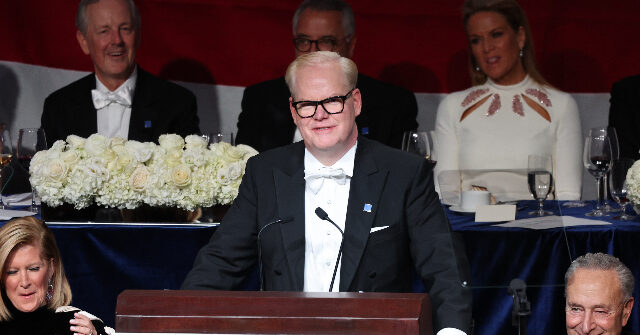At the annual Al Smith Dinner, a charity event in New York, comedian Jim Gaffigan delivered a sharp critique of Democratic elites, particularly targeting the party’s rhetoric surrounding former President Donald Trump. In a humorous yet poignant set, Gaffigan mocked the narrative that portrays Trump as a threat to democracy, pointing out the perceived hypocrisy within the Democratic Party. He alleged that the party had essentially staged a coup to install Kamala Harris as the nominee for vice president, which he emphasized served to undermine their own foundational democratic principles. By doing so, Gaffigan highlighted a disconnect between the Democratic Party’s accusations against Trump and its own actions.
Gaffigan’s commentary reflects a broader discontent with the Democratic establishment, particularly in light of how they handled the 2020 election. His suggestion that Harris was “undemocratically installed” raises questions about party protocols and the integrity of their candidate selection process. The comedian humorously noted that the Democrats who rallied against Trump for fear of his re-election effectively contradicted their stance by sidelining a sitting president from their own ranks. This contradiction was underscored by the presence of Trump at the event, juxtaposed with Harris’s absence, which Gaffigan used to further critique the party’s inconsistent claims of championing democracy.
The dinner attracted notable figures from the Democratic Party, including Senate Majority Leader Chuck Schumer and former Mayor Mike Bloomberg, setting the stage for a night of political banter. While Gaffigan, a devout Catholic and parishioner at St. Patrick’s Old Cathedral, drew on his faith for some of his material, the underlying message was a scathing analysis of Democratic hypocrisy. His observations resonated with those who might have been disillusioned by the party’s approach to governance and candidate selection, suggesting a fissure between what Democrats preach and practice.
As Gaffigan mocked Harris’s rise in the party, he underscored her lack of participation in the primary process—a process fundamental to democratic representation. By highlighting that Harris received no votes during the primaries, Gaffigan pointed out a significant flaw in how the nominee was chosen. This situation exemplifies a broader criticism of political systems where elite decisions overshadow grassroots input, ultimately igniting a conversation about the true meaning of democracy in party politics.
Trump, also present at the dinner, took the opportunity to deliver his own barbed comments aimed at Harris. He quipped that had the invitation extended to her been linked to funding for bailouts in Minneapolis, based on her support for an activist bail fund, she would have surely attended. This jab not only cast Harris in a negative light but also reinforced an ongoing narrative that links Democratic policies to social unrest in the cities. Trump’s comments served to mock not just Harris’s absence, but also the validity of her commitments to democratic values when juxtaposed with her past actions.
In conclusion, the Al Smith Dinner provided a unique platform for both Gaffigan and Trump to address the political dynamics shaping the current landscape. Gaffigan’s roasting of Democratic leaders laid bare perceived contradictions in their rhetoric, while Trump’s remarks served to deepen the divisions within Democratic circles. The event became a microcosm of the larger political discourse, where humor and serious critique intermingled, offering a glimpse into the markedly polarized environment just weeks before a consequential election. Through laughter and satire, both figures communicated their messages on democracy, representation, and party loyalty, challenging attendees and the broader audience to reconsider the principles that guide their political beliefs.

